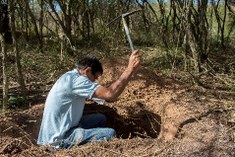Marabú (Dichrostachys cinerea) infestation in Central-eastern Cuba: impacts on soil quality and strategies for sustainable reclamation
Marabú (Dichrostachys cinerea) is a very aggressive invasive woody plant that has invaded vast areas of agricultural land in Cuba and is considered one of the most important threats to agriculture in that country. Despite its aggressive nature, and the difficulties to reclaim infested land, Marabù has also protected these infested soils from degradation processes and may have had positive impacts on soil quality. In this PhD research we will investigate how different times of Marabù infestation have altered biological, chemical and physical soil propterties. This will be done by comparing the change of soil properties in agricultural land that has been under various periods of Marabú infestation (from few to > 25 years) using historical satellite images and a soil sampling campaign in the 1980s. Additionally, we will evaluate different strategies of marabú containment and reclamation, going from very aggressive (bulldozing, herbicides) to more agro-ecological (goat browsing, regular pruning), for their impact on crop yields and on soil quality.
The research aims to answer the following research questions:
- What is the relationship between different times of marabú invasion and general soil quality?
- Could soil type influence the impact of marabú on soil quality?
- What influence do current marabú clearing strategies have on soil quality under climate change?
Is it possible to control marabú invasion by applying eco-friendly strategies such as control through the use and/or implementation of silvopastoral practices?

